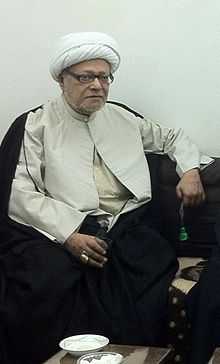Talib Jauhari
| Talib Jauhari طالب جوہری | |
|---|---|
 Talib Jauhari | |
| Born |
27 August 1939 Patna, Bihar, British India |
| Nationality | Pakistan |
| Religion | Shia Islam |
| Era | Modern era |
| Region | Islamic scholar |
| School | Twelver |
Main interests | Islamic law, Islamic philosophy, Quranic exegesis, Hadith, Ilm al-Kalam, Falsafah, Mantiq |
Notable ideas | interpretation (Tafsir) of Quran |
Talib Jauhari (Urdu: طالب جوہری) (born 27 August 1939) is a Pakistani Islamic scholar, religious leader, public speaker, Qur'anic interpreter, Urdu poet, historian and philosopher of the Shia Sect of Islam.
Biography
Jauhari was born in Patna, Bihar, British India, and has been addressing Majlis-e-Aza for the past 45 years in Pakistan and abroad. His birth name was Abu Talib Jauhar, which during his studies in Iraq turned into Talib Jauhari. His family has produced many scholars and religious authorities in the past two centuries.
He is the son of Muhammad Mustafa Jauhar, who was himself an Islamic scholar, philosopher and poet. Jauhar wrote books on Islamic philosophy; for example, Tawheed o Adal Nahj al-Balagha ki roshni mein and Saboot-e-Khuda; and on jurisprudence, for example Aqaid-e-Jaafria and Asool-e-Jaafria. Deewan-e-Mehrab was his poetic work.
Hakeem Muhammad Muslim, also a prominent scholar, was his grandfather. He researched on Islamic eschatology and wrote a book on Falsafah-e-Barzakh titled Alam-e-Barzakh me Halchal.
Jauhari's sons Asad Jauhari, Riaz Jauhari and Amjad Jauhari and his daughter Husna Jauhari are also scholars. Among them Asad Jauhari and Amjad Jauhari received religious education from Hawza Ilmia Qom, Iran. Amjad Jauhari has also received Ijaza-e-Riwayah from notable Iranian scholars from Qom.
Education
He received his first education from his father. At the age of 13 he travelled to Najaf, Iraq, to receive religious education at the Hauza Ilmia Najaf-e-Ashraf. There he studied until the age of 26. During this period he wrote a book on Islamic economics. In 1965, he returned from Iraq and completed a Masters degree in Islamic Studies from Karachi University. He began his career as a Principal of Jamia Imamia Nazimabad Karachi.
Islamic orator
He has been addressing Majlis-e-Aza since he returned from Iran in 1965. He has also delivered speeches in Pakistan and abroad on Islamic themes, particularly on the household of the Islamic prophet Muhammad.
Khateeb-e-Sham-e-Ghareeban
Between 1974 and 2006 he addressed main Muharram majalis in Nishtar Park, Karachi.
Since 1988 he started addressing Majlis-e-Sham-e-Ghareeban on Pakistan State Television PTV every year and received the title of Khateeb-e-Sham-e-Ghareeban. He is the third person after Rasheed Turabi and Naseer Ijtehadi to receive this title for delivering Majlis-e-Sham-e-Ghareeban on state television which is telecasted throughout Pakistan and beyond.
Karachi University Lectures:
He delivered lectures at Karachi University on Islamic philosophy upon the request of the university's vice-chancellor.
Fehm-ul-Quran Lectures:
He also delivered Qur'anic exposition lectures on PTV on a program named "Fehm ul Quran" which became PTV's most popular religious program of the 1980s.
Literary work
As an author, he has published a variety of literary works. He has written Qur'anic exegesis in Urdu; for example, Ahsan-al-Hadees. He has authored other religious books, including Alamatay Zahooray Mehdi and Khulfa-e-Asna Ashar, and philosophical books including Aqliyat-e-Maasir. His historical books include Hadees-e-Karbala and his poetry includes Harf-e-Namoo and Pas-e-Afaq.
Bibliography
Tafseer-e-Quran:
- Ahsan al Hadees (Qur'anic exegesis)
Maqtal:
- Hadees e Karabala
Religion:
- Zikray Masoom
- Nizaam Hayat-e-Insani
- Khulafaey Isna A'shr
- Alamatay Zahooray Mehdi
Philosophy:
- Aqliyat-e-Ma'asir (2005)
Poetry:
- Harf-e-Namoo (Urdu poetry)
- Pas-e-Afaq (Urdu poetry)
- Shakh e Sada (Urdu poetry)
Awards
Jauhari has received Sitara-e-Imtiaz from The Government of Pakistan for his contributions to Islamic scholarship.
See also
External links
- "Khursheed-e-Khawar" by Hujjat-ul-Islam Maulana Saeed Akhtar from India (A book on biography of the Shia scholars of Indian sub-continent)
- Allama Talib Jauhari Page on Facebook
- Allama Talib Jauhari Majalis
- Fehm-ul-Quran series by Allama Talib Jauhari on PTV
- Allama Talib Jauhari Books
- Allama Talib Jauhari Online Books
- Allama Talib Jauhri Speeches (Majaalis)
- Ahsan-al-hadees by Allama Talib Jauhari
- Allama Talib Jauhari Lectures/Majalis
- Unity and justice of God Book by Maulana Muhammad Mustafa Jauhar
- 'Truth Wisdom and Justice behind Oneness of Allah' by Maulana Jauhar
- Maulana Mushammad Mustafa Jauhar Lectures
- Allama Amjad Jauhari Fan Club on Facebook
- Allama Amjad Jauhari Majalis
- Assassination attempt on Allama Talib Jauhari